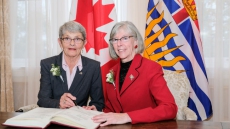MONTREAL — The federal government plans to raise the cap on foreign ownership of Canadian airlines and adopt a passenger bill of rights in a bid to drive down fares and protect travellers faced with airline delays.
Transport Minister Marc Garneau promised legislation that would allow international companies to own up to 49 per cent of an airline in Canada, a jump from the current cap of 25 per cent. However, single international investors or a combination of such investors will still be capped at 25 per cent.
Garneau said loosening Canada's strict foreign investment rules for airlines will help create more competition and allow the launch of low-cost carriers.
"This can bring down airfares and it can also provide more destinations and more choice for consumers," he told reporters Thursday after unveiling the government's transportation plans for the coming decades.
The plan — responding to recommendations in a review of the Canada Transportation Act by former minister David Emerson — includes promised action on railway safety, drones, transportation emissions, coastal protections and development of transportation infrastructure in the North.
Until legislation is changed, Garneau said he is granting exemptions that will allow aspiring discount airlines Canada Jetlines and Enerjet to land more international investors, giving the companies what they have long requested.
Canada Jetlines CEO Jim Scott said the move will allow the Vancouver-based company to lock up investors so it can launch service next summer offering a 30 per cent discount in fares, using cheaper secondary airports.
"Canada is the only G7 country that has not brought this airline model into its network," he said, adding that existing carriers led by Air Canada and WestJet offer similar fares.
Scott said Canada Jetlines plans to launch with two leased aircraft and build a fleet of 40 planes by the eighth year of operation. It's considering the purchase of Bombardier CSeries aircraft as it moves to purchase one type of plane in its fleet.
Garneau said the exemption was designed to help passengers by boosting airline competition, not to give Bombardier access to new aircraft orders.
The minister said the government will also work to reduce waits at airport security to international standards by looking at new equipment and technology.
As well, it will introduce an air passenger rights regime in the coming months that will establish clear, minimum requirements so Canadians know when they are eligible for compensation in cases of oversold flights or lost luggage.
The government would craft into Canadian law something that had been pushed by the NDP and picked up on by the previous Conservative government, but never turned into reality.
Garneau said the plan would pull ideas from dozens of other countries that have similar regimes, including the United States and members of the European Union.
"What we want to do is come up with something that will be very, very clear in terms of there being consequences if the rights of passengers are violated but at the same time that are reasonable."
The Canadian Automobile Association, which sells airfares and vacation packages, praised the move, saying it will provide a level playing field by ensuring all carriers follow the same rules.
"We think that Canadian air travellers deserve to be treated as well as American and EU passengers when they travel and we're hopeful that today's announcement will put us on the road towards that," said managing director Ian Jack.
Passenger rights advocate Gabor Lukacs welcomed the bill of rights but said it can only be effective if the Canadian Transportation Agency is given teeth to enforce the rules, as is the case in the United States which doles out hefty fines.
"If you have very good laws, but they get all ignored, what use will it have?" he said in an interview.
Lukacs, who has frequently challenged airline practices, said the quasi-judicial agency is biased in favour of airlines and does little to enforce existing rules under the Montreal Convention.





